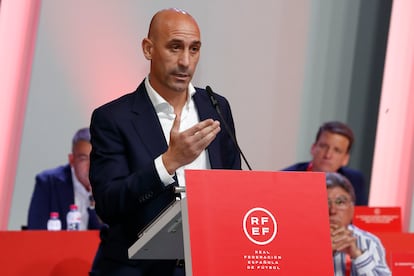Defiant RFEF chief Luis Rubiales refuses to resign over Jenni Hermoso scandal
The president of the Spanish Football Federation presented himself as the victim of a witch hunt by ‘false feminists’ and claims World Cup final kiss with Spain midfielder was ‘consensual’

“I will not resign, I will not resign, I will not resign,” insisted Spanish Football Federation (RFEF) president Luis Rubiales. Empowered by the backing of the RFEF assembly, with his daughters standing a few meters away, Rubiales delivered a performance Friday aimed at presenting himself as a martyr who gave national team player Jennifer Hermoso a “consensual peck” during the celebrations following Spain’s victory at the World Cup in Australia. It was a kiss that swiftly went around the world, sparking outrage and leading to calls for Rubiales to step down from his position with immediate effect. The RFEF chief, however, has elected to cling to power despite the growing clamor for his letter of resignation. He did so with an aggressive speech, questioning feminism and even announcing legal measures of his own against the acting vice-president of the Spanish government, Yolanda Díaz, who has led calls for Rubiales to step down alongside acting Spanish Prime Minister Pedro Sánchez.
But Rubiales will not resign; it will now fall to the government, with the legal complaints in its possession, to decide whether to end his mandate. After hearing Rubiales’ speech, the Superior Sports Council (CSD) warned that it would take the complaints lodged against the RFEF president to Spain’s Administrative Court of Sport (TAD) this Friday and request his suspension for serious misconduct.
FIFA, the governing body of soccer, opened a disciplinary case against Rubiales on Thursday. The FIFA disciplinary committee was tasked with weighing whether Rubiales violated its code relating to “the basic rules of decent conduct” and “behaving in a way that brings the sport of football and/or FIFA into disrepute.”
FIFA gave no timetable for a ruling. The body’s disciplinary judges can impose sanctions on individuals ranging from warnings and fines to suspensions from the sport.
Rubiales shielded his defense by detailing the kiss he planted on an unsuspecting Hermoso: he offered a description that either does not match what was seen on television, or refers to the moments prior to the images that were broadcast live during the celebrations after Spain beat England to claim the World Cup title. Hermoso, meanwhile, has placed her case in the hands of Futpro, the union that represents her, and has asked for “exemplary measures, against Rubiales.

Rubiales: “It was a spontaneous, mutual, and euphoric kiss. And, above all, consensual”
In the RFEF chief’s version of events, he said Hermoso had lifted him up in celebration and he asked her for “a little kiss?” and she said yes.
“The kiss was the same I could give one of my daughters,” Rubiales said. “It was a spontaneous, mutual, and euphoric kiss. And, above all, consensual,” he concluded, while adding that he is the victim of a witch hunt by “false feminists.”
Rubiales is aware that what happened in Sydney could land him with a temporary suspension that could be extended to full disqualification from the RFEF. Meeting with the presidents of the regional associations in the morning, Rubiales dismissed all the vice presidents except Pedro Rocha, of the Extremadura regional association. “He will be the interim president if the process opened by the CSD prevents me from continuing as president,” he said. For now, Rubiales is entrenched in his position, encouraged by the applause of the assembly members present on Friday and despite the rejection of Spain’s clubs, political class, and a large section of society, which culminated with the scandal spilling over into the men’s national team with the announcement of Real Betis striker Borja Iglesias that he would no longer be available for selection while Rubiales remains at the helm of the federation.
After apologizing to the Queen of Spain and 16-year-old Princess Sofía, who were standing nearby when Rubiales grabbed his crotch in a victory gesture during the World Cup final, Rubiales went on the attack. “To my daughters I say that today they have to learn a lesson: what equality is. You have to differentiate between truth and lies, and I am telling the whole truth. You are feminists and not the false feminism that is out there. They don’t care about people. They are preparing a social execution so they can put on a medal and say they are moving forward. It has taken them five days to congratulate us on the World Cup. They have referred to ‘sexual violence.’ What will the women who have been sexually assaulted think? To these people who have said this about me, who are trying to publicly assassinate me, I say that I will defend myself in court,” Rubiales announced.
At the end of the assembly, the president of the National Women’s Football Committee, Rafael del Amo, announced that he had resigned because he felt uncomfortable with the situation.
“What we have seen today in the federation assembly is unacceptable. The government must act and take urgent measures: impunity for macho actions is over. Rubiales cannot continue in office,” Díaz said after the assembly.
The president of the Spanish women’s soccer league, Beatriz Álvarez, told Spanish state broadcaster RTVE that she was not surprised because Rubiales’ “ego is above his dignity.”
“What surprises and scandalizes me are his words,” Álvarez said. “Every time he speaks he shows what kind of person he really is.”
Sign up for our weekly newsletter to get more English-language news coverage from EL PAÍS USA Edition
Tu suscripción se está usando en otro dispositivo
¿Quieres añadir otro usuario a tu suscripción?
Si continúas leyendo en este dispositivo, no se podrá leer en el otro.
FlechaTu suscripción se está usando en otro dispositivo y solo puedes acceder a EL PAÍS desde un dispositivo a la vez.
Si quieres compartir tu cuenta, cambia tu suscripción a la modalidad Premium, así podrás añadir otro usuario. Cada uno accederá con su propia cuenta de email, lo que os permitirá personalizar vuestra experiencia en EL PAÍS.
¿Tienes una suscripción de empresa? Accede aquí para contratar más cuentas.
En el caso de no saber quién está usando tu cuenta, te recomendamos cambiar tu contraseña aquí.
Si decides continuar compartiendo tu cuenta, este mensaje se mostrará en tu dispositivo y en el de la otra persona que está usando tu cuenta de forma indefinida, afectando a tu experiencia de lectura. Puedes consultar aquí los términos y condiciones de la suscripción digital.








































